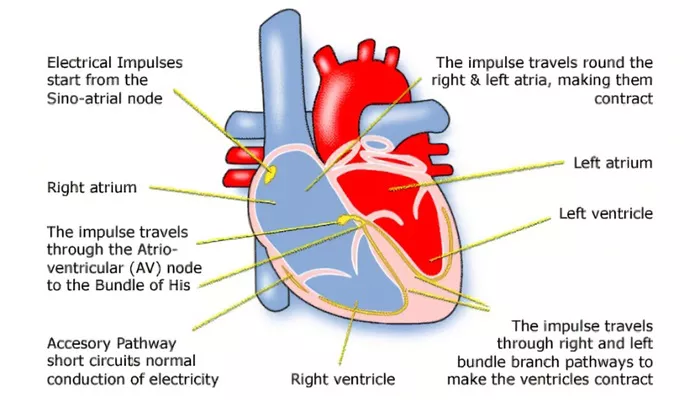Heart palpitations are sensations that feel like your heart is pounding, fluttering, or beating irregularly. They can occur at any time and may be triggered by various factors, including stress, caffeine, hormonal changes, or underlying heart conditions. While palpitations are often benign and not indicative of serious health issues, they can be alarming for patients. This article explores how doctors diagnose and treat palpitations, helping to alleviate patient concerns and improve overall heart health.
What Are Heart Palpitations?
Palpitations are typically described as an increased awareness of the heartbeat. They can manifest as a racing heart, irregular beats, or a feeling that the heart has skipped a beat. These sensations can be caused by numerous factors:
Lifestyle Choices: Excessive caffeine intake, alcohol consumption, smoking, and use of certain medications can trigger palpitations.
Medical Conditions: Conditions such as hyperthyroidism, anemia, dehydration, and electrolyte imbalances may lead to palpitations.
Heart Disorders: Arrhythmias—irregular heart rhythms—are a significant cause of palpitations. Common types include atrial fibrillation and supraventricular tachycardia.
Understanding the underlying cause of palpitations is crucial for determining the appropriate treatment.
SEE ALSO: Can I Exercise with Sinus Tachycardia
Diagnosis of Palpitations
When patients report palpitations, doctors typically conduct a thorough evaluation to identify the cause. This process may include:
Medical History: A detailed history of symptoms, lifestyle factors, and any existing medical conditions helps in understanding the context of the palpitations.
Physical Examination: A physical exam may reveal signs of underlying conditions that could contribute to palpitations.
Electrocardiogram (ECG): An ECG records the electrical activity of the heart and can help identify arrhythmias or other heart issues.
Holter Monitor: This portable device records heart rhythms over 24 to 48 hours to capture intermittent palpitations that may not occur during a doctor’s visit.
Event Monitor: Similar to a Holter monitor but used for longer periods (up to 30 days), allowing patients to activate it when they experience symptoms.
Blood Tests: These tests can check for thyroid function, electrolyte levels, and other markers that may influence heart rhythm.
Treatment Options for Palpitations
The treatment for palpitations depends on their severity and underlying cause. Here are common approaches:
1. Lifestyle Modifications
For many patients with benign palpitations, lifestyle changes can significantly reduce symptoms:
Avoid Triggers: Reducing or eliminating caffeine, alcohol, and nicotine can help manage symptoms.
Stress Management: Techniques such as yoga, meditation, and deep breathing exercises can alleviate stress-induced palpitations.
Regular Exercise: Engaging in regular physical activity promotes overall cardiovascular health but should be balanced with rest to avoid overexertion.
2. Medications
If lifestyle changes are insufficient or if palpitations are linked to an underlying condition, doctors may prescribe medications:
Beta Blockers: These drugs help slow down the heart rate and reduce anxiety-related palpitations. They are commonly used for patients experiencing frequent episodes.
Calcium Channel Blockers: These medications can help manage certain types of arrhythmias by relaxing the heart muscles and slowing down electrical conduction.
Antiarrhythmic Drugs: For more severe cases of arrhythmia causing palpitations, stronger antiarrhythmic medications may be necessary to stabilize heart rhythm.
3. Interventional Procedures
In cases where medications do not provide relief or when a specific arrhythmia is identified as the cause of palpitations, interventional procedures may be considered:
Catheter Ablation: This minimally invasive procedure involves threading catheters through blood vessels to the heart. The doctor then uses radiofrequency energy to destroy small areas of heart tissue that are causing abnormal electrical signals.
Cardioversion: This procedure restores normal rhythm using electrical shocks delivered to the chest wall. It is often used in cases of atrial fibrillation or other persistent arrhythmias.
Implantable Devices: In some cases, an implantable cardioverter-defibrillator (ICD) may be recommended for patients at risk of life-threatening arrhythmias. This device monitors heart rhythms and delivers shocks if dangerous arrhythmias occur.
When to Seek Medical Attention
While most cases of palpitations are harmless, certain symptoms warrant immediate medical evaluation:
Palpitations accompanied by chest pain or discomfort
Shortness of breath or difficulty breathing
Dizziness or fainting
A rapid heartbeat lasting more than a few minutes
Symptoms occurring after starting new medications
These symptoms could indicate a more serious condition requiring prompt intervention.
Reassurance And Psychological Support
For many individuals experiencing benign palpitations—especially those linked to anxiety—reassurance from healthcare providers plays a critical role in treatment. Understanding that these sensations are often not harmful can alleviate anxiety and improve quality of life.
In addition to medical treatment options, psychological support through counseling or cognitive-behavioral therapy (CBT) may be beneficial for patients whose palpitations are exacerbated by stress or anxiety disorders.
Conclusion
Heart palpitations can be a concerning symptom for many individuals; however, understanding their causes and treatment options is crucial for effective management. Doctors employ a comprehensive approach involving lifestyle modifications, medications, interventional procedures, and psychological support tailored to each patient’s needs.
With appropriate evaluation and treatment strategies in place, most patients can find relief from their symptoms and maintain confidence in their cardiovascular health.


